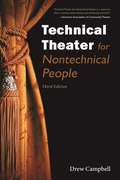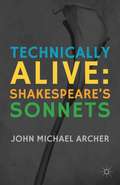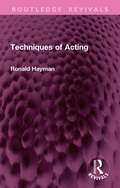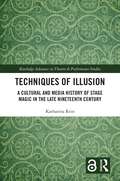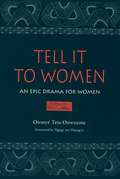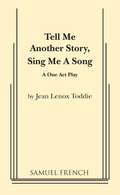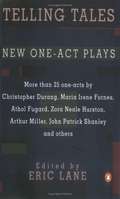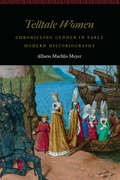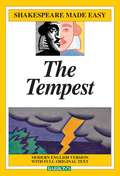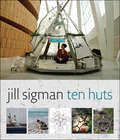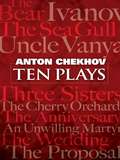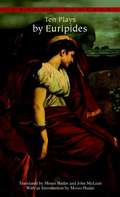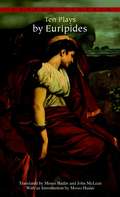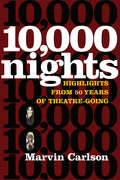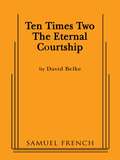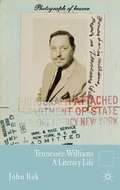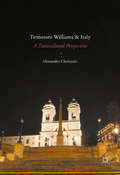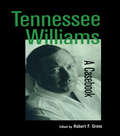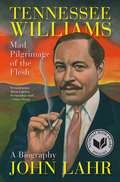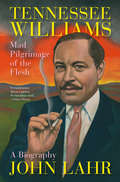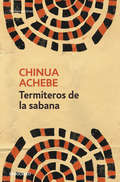- Table View
- List View
Technical Theater for Nontechnical People: Second Edition
by Drew CampbellTechnical Theater for Nontechnical People helps actors, directors, stage managers, producers, and event planners understand every aspect of technical theater-from scenery, lighting, and sound to props, costumes, and stage management. In this thoroughly revised new edition, the popular guide firmly embraces the digital age with new content about digital audio, intelligent lighting, LED lighting, video projection, and show control systems, all explained in the same approachable style that has kept this book in the pockets of industry professionals for many years. A brand-new chapter on sound design has also been added, and every chapter has been updated with more information about the basics of theater technology, including draperies, lighting instruments, microphones, costume sketches, and more. This book teaches:Who's who on a theatrical production teamWhat is needed to know about technical theater and whyWhat to look for when choosing a space for a showHow to communicate with lighting, scenery, audio, and costume designersHow to stage manage an effective show or presentationCovering both traditional and digitally supported backstage environments, this book is an essential guide for working with every technical aspect of theater!Allworth Press, an imprint of Skyhorse Publishing, publishes a broad range of books on the visual and performing arts, with emphasis on the business of art. Our titles cover subjects such as graphic design, theater, branding, fine art, photography, interior design, writing, acting, film, how to start careers, business and legal forms, business practices, and more. While we don't aspire to publish a New York Times bestseller or a national bestseller, we are deeply committed to quality books that help creative professionals succeed and thrive. We often publish in areas overlooked by other publishers and welcome the author whose expertise can help our audience of readers.
Technically Alive
by John Michael ArcherDrawing on the later writings of Martin Heidegger, the book traces the correspondence between the philosopher's concept of technology and Shakespeare's poetics of human and natural productivity in the Sonnets.
Techniques of Acting (Routledge Revivals)
by Ronald HaymanOriginally published in 1969, this was the first book of its kind: an attempt to describe the different approaches that the actor needs to make to different media – theatre, film and television – and to show how the art of acting, which never stops evolving had entered into a new phase of growth in the sixties. Ronald Hayman examines questions which are basic, but had often been ignored: What exactly goes on inside the actor’s mind while (s)he is preparing a part? How much do actors vary in their approach? Where does personality stop and technique begin? This wide-ranging study of the actor at work is based partly on what outstanding actors have said about their methods but chiefly on close analysis of actual performances in plays, films and on television. Laurence Olivier, Helene Weigel, Jeanne Moreau and many others are both examined in close-up and viewed in perspective against the giants of the past like Bernhardt and Salvini.
Techniques of Illusion: A Cultural and Media History of Stage Magic in the Late Nineteenth Century (Routledge Advances in Theatre & Performance Studies)
by Katharina ReinThis book explores stage conjuring during its “golden age,” from about 1860 to 1910. This study provides close readings highlighting four paradigmatic illusions of the time that stand in for different kinds of illusions typical of stage magic in the “golden age” and analyses them within their cultural and media-historical context: “Pepper’s Ghost,” the archetypical mirror illusion; “The Vanishing Lady,” staging a teleportation in a time of a dizzying acceleration of transport; “the levitation,” simulating weightlessness with the help of an extended steel machinery; and “The Second Sight,” a mind-reading illusion using up-to-date communication technologies. These close readings are completed by writings focusing on visual media and expanding the scope backwards and forwards in time, roughly to 1800 and to 2000. This exploration will be of great interest to students and scholars in theatre and performance studies.
Teddy Ferrara
by Christopher Shinn"Mr. Shinn is among the most provocative and probing of American playwrights today."-The New York Times"Chris Shinn explores politics and ethics without moralizing and finds justice and beauty in intimate life, keenly observed and rendered scrupulously, unapologetically, fearlessly . . . I admire his work enormously."-Tony KushnerWhen a campus tragedy makes national headlines, Gabe, a senior who runs the Queer Students Group, discovers that events surrounding the tragedy aren't as straightforward as they seem. A Pulitzer Prize finalist's searing play about what happens when a tragedy sparks a movement - and the truth gets lost along the way. World Premiere at Chicago's Goodman Theatre in winter 2013.Christopher Shinn's works include Where Do We Live, Four, Other People, What Didn't Happen, On the Mountain, and The Coming World. He has received the Obie Award for playwriting and a Guggenheim Fellowship in Playwriting, and has also been shortlisted for the Evening Standard Theatre Award for Best Play and nominated for an Olivier Award for Most Promising Playwright.
Teen Take Ka Upanyas: तीन टके का उपन्यास
by Bertolt Brecht'तीन टके का उपन्यास' दरअसल बेर्टोल्ट ब्रेष्ट के प्रसिद्ध नाटक ‘थ्री पेनी ऑपेरा’ का ही एक विस्तृत और व्यापक संस्करण है. ‘थ्री पेनी आपेरा’ ब्रिटिश नाटककार जॉन गे द्वारा लिखित ‘बेगर्स ऑपेरा’ पर आधारित था. 1728 में लिखे गये ‘बेगर्स ऑपेरा’ के सभी केन्द्रीय चरित्र जैसे मैकहीथ, पीचम, जेनी, पॉली, आदि ब्रेष्ट के ‘थ्री पेनी ऑपेरा’ में थे. 1928 में ब्रेष्ट ने यह उपन्यास पूरा किया. 1934 में उन्होंने इन्हीं चरित्रों और उसी कहानी को लेकर ‘थ्री पेनी नॉवेल’ यानी ‘तीन टके का उपन्यास’ लिखा. जहाँ नाटक में ब्रेष्ट के पास एक-एक चरित्र को विकसित करने का मौका नहीं था, वहीं उपन्यास में उन्होंने हर चरित्र को पूरी तरह विकसित किया और बोलचाल की भाषा में होने के बावजूद इसे ‘एपिकल’ बना दिया।
Tell It to Women: An Epic Drama for Women
by Ngugi Wa Thiong’o Osonye Tess OnwuemeUsing the magic of movement, dance, and drama, and the devices of humor and metaphor, Osonye Tess Onwueme has created a post-feminist epic drama that transcends current feminist theories. An ideologically and politically powerful work, Tell It to Women offers a critical discourse on the western feminist movement from an African traditional perspective, focusing attention on the often silenced issues of intra-gender politics and class inequities.
Tell Me Another Story, Sing Me a Song
by Jean Lenox ToddiePlay . Jean Lenox Toddie. Characters: 2 female. Bare stage or simple set. . This witty look at mother daughter relationships is a light hearted exploration of irritations and misunderstandings that build walls between a woman and her female off spring-- and the love and compassion that destroys these walls. The crisis and humor of childhood, adolescence, adulthood and old age are evoked in a celebration of dissonance and the harmony between mothers and daughters. With the light touch of fantasy, it touches some of our deepest emotions.
Telling Tales: New One-Act Plays
by Eric LaneAn exciting and varied collection of contemporary one-act plays from some of today’s best playwrights.
Telltale Women: Chronicling Gender in Early Modern Historiography (Women and Gender in the Early Modern World)
by Allison Machlis MeyerTelltale Women fundamentally reimagines the relationship between the history play and its source material as an intertextual one, presenting evidence for a new narrative about how—and why—these genres disparately chronicle the histories of royal women. Allison Machlis Meyer challenges established perceptions of source study, historiography, and the staging of gender politics in well-known drama by arguing that chronicles and political histories frequently value women&’s political interventions and use narrative techniques to invest their voices with authority. Dramatists who used these sources for their history plays thus encountered a historical record that offered surprisingly ample precedents for depicting women&’s perspectives and political influence as legitimate, and writers for the commercial theater grappled with such precedents by reshaping source material to create stage representations of royal women that condemned queenship and female power. By tracing how the sanctioning of women&’s political participation changes from the narrative page to the dramatic stage, Meyer demonstrates that gender politics in both canonical and noncanonical history plays emerge from playwrights&’ intertextual engagements with a rich alternative view of women in the narrative historiography of the sixteenth and seventeenth centuries.
Tempest: Modern English Version Side-by-side With Full Original Text (Shakespeare Made Easy)
by William ShakespeareThis wonderful presentation of Shakespeare's The Tempest features the play's original lines on each left-hand page, and a modern, easy-to-understand "translation" on the facing right-hand page. This invaluable teaching-study guide also includes:Helpful background information that puts the play in its historical perspectiveDiscussion questions that teachers can use to spark student class participation, and which students can use as springboards for their own themes and term papersFact quizzes, sample examinations, and other features that improve student comprehension of what the play is about
Ten Huts
by Jill SigmanDescribed as an artist of “prodigious imagination and intelligence” by the New York Times, Jill Sigman makes art at the intersection of dance, visual art, and social practice. An artist’s book that explores the ability of art to engage us and re-envision our environment, Ten Huts documents a series of site-specific huts that were hand built from found and repurposed materials ranging from the mundane (e-waste and plastic bottles) to the bizarre (circus detritus, dental molds, and mugwort grown on the banks of a toxic creek) in landscapes as varied as industrial Brooklyn and the Norwegian Arctic. Each of the extraordinary huts in this full-color book is a structure, a sculpture, and an emergency preparedness kit that raises questions about sustainability, shelter, real estate, and our future on this planet. Ten Huts features an artist essay by Jill Sigman and 499 illustrations, along with essays about The Hut Project by Thomas Hylland Eriksen (anthropology), André Lepecki (performance studies), Matthew McLendon (art history), Elise Springer (philosophy), and Eva Yaa Asantewaa (dance). Also includes a foreword by Pamela Tatge.
Ten Plays
by Anton ChekhovHere in one compact and modestly priced edition are the celebrated Russian playwright's most popular works. In addition to five full-length plays--The Sea Gull, Uncle Vanya, The Three Sisters, The Cherry Orchard, and Ivanov--this anthology features five of Anton Chekhov's one-act comedies: The Anniversary, An Unwilling Martyr, The Wedding, The Bear, and The Proposal.Chekhov's taste for vaudeville shows and French farces influenced his comic one-acts, which are widely regarded as masterpieces of the genre. His greatest fame rests upon his full-length tragedies, which focus on mood and characterization rather than plot. Chekhov considered his famous tragedies a form of comic satire--with the bleakness of life in czarist Russia at the turn of the twentieth century as their central joke. "All I wanted was to say honestly to people: 'Have a look at yourselves and see how bad and dreary your lives are!'" explained the playwright. In addition to their enduring emotional and intellectual appeal to audiences, Chekhov's modern realist dramas continue to influence theatrical literature and performance.
Ten Plays
by Moses Hadas Euripides John McleanThe first playwright of democracy, Euripides wrote with enduring insight and biting satire about social and political problems of Athenian life. In contrast to his contemporaries, he brought an exciting--and, to the Greeks, a stunning--realism to the "pure and noble form" of tragedy. For the first time in history, heroes and heroines on the stage were not idealized: as Sophocles himself said, Euripides shows people not as they ought to be, but as they actually are.
Ten Plays by Euripides
by EuripidesThe first playwright of democracy, Euripides wrote with enduring insight and biting satire about social and political problems of Athenian life. In contrast to his contemporaries, he brought an exciting--and, to the Greeks, a stunning--realism to the "pure and noble form" of tragedy. For the first time in history, heroes and heroines on the stage were not idealized: as Sophocles himself said, Euripides shows people not as they ought to be, but as they actually are.
Ten Thousand Nights: Highlights from 50 Years of Theatre-Going
by Marvin CarlsonEsteemed scholar and theater aficionado Marvin Carlson has seen an unsurpassed number of theatrical productions in his long and distinguished career. Ten Thousand Nights is a lively chronicle of a half-century of theatre-going, in which Carlson recalls one memorable production for each year from 1960 to 2010. These are not conventional reviews, but essays using each theater experience to provide an insight into the theater and theatre-going at a particular time. The range of performances covered is broad, from edgy experimental fare to mainstream musicals, most of them based in New York but with stops at major theater events in Paris, Berlin, Moscow, Milan, and elsewhere. The engagingly written pieces convey a vivid sense not only of each production but also of the particular venue, neighborhood, and cultural context, covering nearly all significant movements, theater artists, and groups of the late twentieth century.
Ten Times Two: The Eternal Courtship
by David BelkeFull Length / Romantic Comedy / 2m, 1f / Interior An epic romantic comedy. When Ephraim, an evildoer cursed with immortality, bets he can win the love of a barmaid in 1399 it launches a romantic pursuit spanning the centuries from the Middle Ages to Modern Times. Under the watchful eye of a mysterious Host the couple meets every seventy-five years as Ephraim schemes to capture the heart of his quarry who reincarnates as a dizzying array of different women through the years. But in order to win love the villain must eventually learn to become a human being.
Tennessee Williams
by John S. BakPerfect for students of English Literature, Theatre Studies and American Studies at college and university, The Theatre of Tennessee Williams provides a lucid and stimulating analysis of Willams' dramatic work by one of America's leading scholars. With the centennial of his birth celebrated amid a flurry of conferences devoted to his work in 2011, and his plays a central part of any literature and drama curriculum and uibiquitous in theatre repertoires, he remains a giant of twentieth century literature and drama. In Brenda Murphy's major study of his work she examines his life and career and provides an analysis of more than a score of his key plays, including in-depth studies of major works such as A Streetcar Named Desire, The Glass Menagerie, Cat on a Hot Tin Roof and others. She traces the artist figure who features in many of Williams' plays to broaden the discussion beyond the normal reference points. As with other volumes in Methuen Drama's Critical Companions series, this book features too essays by Bruce McConachie, John S. Bak, Felicia Hardison Londr#65533; and Annette Saddik, offering perspectives on different aspects of Williams' work that will assist students in their own critical thinking.
Tennessee Williams and Italy
by Alessandro ClericuzioThis book reveals for the first time the import of a hugenetwork of connections between Tennessee Williams and the country closest to his heart, Italy. America's most thought-provoking playwright loved Italy morethan any other country outside the U. S. and was deeply influenced by itsculture for most of his life. Anna Magnani's film roles in the 1940s, ItalianNeo-realist cinema, the theatre of Eduardo De Filippo, as well as the actualexperience of Italian life and culture during his long stays in the countrywere some of the elements shaping his literary output. Through his lover FrankMerlo, he also had first-hand knowledge of Italian-American life in Brooklyn. Tracing the establishment of his reputation with theItalian intelligentsia, as well as with theatre practitioners and withgenerations of audiences, the book also tells the story of a momentouscollaboration in the theatre, between Williams and Luchino Visconti, who had todefy the unceasing control Italian censorship exerted on Williams for decades.
Tennessee Williams and the Theatre of Excess
by Annette J. SaddikThe plays of Tennessee Williams' post-1961 period have often been misunderstood and dismissed. In light of Williams' centennial in 2011, which was marked internationally by productions and world premieres of his late plays, Annette J. Saddik's new reading of these works illuminates them in the context of what she terms a 'theatre of excess', which seeks liberation through exaggeration, chaos, ambiguity, and laughter. Saddik explains why they are now gaining increasing acclaim, and analyzes recent productions that successfully captured elements central to Williams' late aesthetic, particularly a delicate balance of laughter and horror with a self-consciously ironic acting style. Grounding the plays through the work of Bakhtin, Artaud, and Kristeva, as well as through the carnivalesque, the grotesque, and psychoanalytic, feminist, and queer theory, Saddik demonstrates how Williams engaged the freedom of exaggeration and excess in celebration of what he called 'the strange, the crazed, the queer'.
Tennessee Williams: A Casebook
by Robert F. GrossTennessee Williams' plays are performed around the world, and are staples of the standard American repertory. His famous portrayals of women engage feminist critics, and as America's leading gay playwright from the repressive postwar period, through Stonewall, to the growth of gay liberation, he represents an important and controversial figure for queer theorists. Gross and his contributors have included all of his plays, a chronology, introduction and bibliography.
Tennessee Williams: Mad Pilgrimage of the Flesh
by John LahrJohn Lahr has produced a theater biography like no other. Tennessee Williams: Mad Pilgrimage of the Flesh gives intimate access to the mind of one of the most brilliant dramatists of his century, whose plays reshaped the American theater and the nation's sense of itself. This astute, deeply researched biography sheds a light on Tennessee Williams's warring family, his guilt, his creative triumphs and failures, his sexuality and numerous affairs, his misreported death, even the shenanigans surrounding his estate. With vivid cameos of the formative influences in Williams's life--his fierce, belittling father Cornelius; his puritanical, domineering mother Edwina; his demented sister Rose, who was lobotomized at the age of thirty-three; his beloved grandfather, the Reverend Walter Dakin--this book is as much a biography of the man who created A Streetcar Named Desire, The Glass Menagerie, and Cat on a Hot Tin Roof as it is a trenchant exploration of Williams's plays and the tortured process of bringing them to stage and screen. The portrait of Williams himself is unforgettable: a virgin until he was twenty-six, he had serial homosexual affairs thereafter as well as long-time, bruising relationships with Pancho Gonzalez and Frank Merlo. With compassion and verve, Lahr explores how Williams's relationships informed his work and how the resulting success brought turmoil to his personal life. Lahr captures not just Williams's tempestuous public persona but also his backstage life, where his agent Audrey Wood and the director Elia Kazan play major roles, and Marlon Brando, Anna Magnani, Bette Davis, Maureen Stapleton, Diana Barrymore, and Tallulah Bankhead have scintillating walk-on parts. This is a biography of the highest order: a book about the major American playwright of his time written by the major American drama critic of his time.
Tennessee Williams: Mad Pilgrimage of the Flesh
by John LahrWinner of the National Book Critics Circle Award in Biography and Finalist for the National Book Award. The definitive biography of America's greatest playwright from the celebrated drama critic of The New Yorker. John Lahr has produced a theater biography like no other. Tennessee Williams: Mad Pilgrimage of the Flesh gives intimate access to the mind of one of the most brilliant dramatists of his century, whose plays reshaped the American theater and the nation's sense of itself. This astute, deeply researched biography sheds a light on Tennessee Williams's warring family, his guilt, his creative triumphs and failures, his sexuality and numerous affairs, his misreported death, even the shenanigans surrounding his estate. With vivid cameos of the formative influences in Williams's life--his fierce, belittling father Cornelius; his puritanical, domineering mother Edwina; his demented sister Rose, who was lobotomized at the age of thirty-three; his beloved grandfather, the Reverend Walter Dakin--Tennessee Williams: Mad Pilgrimage of the Flesh is as much a biography of the man who created A Streetcar Named Desire, The Glass Menagerie, and Cat on a Hot Tin Roof as it is a trenchant exploration of Williams's plays and the tortured process of bringing them to stage and screen. The portrait of Williams himself is unforgettable: a virgin until he was twenty-six, he had serial homosexual affairs thereafter as well as long-time, bruising relationships with Pancho Gonzalez and Frank Merlo. With compassion and verve, Lahr explores how Williams's relationships informed his work and how the resulting success brought turmoil to his personal life. Lahr captures not just Williams's tempestuous public persona but also his backstage life, where his agent Audrey Wood and the director Elia Kazan play major roles, and Marlon Brando, Anna Magnani, Bette Davis, Maureen Stapleton, Diana Barrymore, and Tallulah Bankhead have scintillating walk-on parts. This is a biography of the highest order: a book about the major American playwright of his time written by the major American drama critic of his time. Winner of the 2015 Sheridan Morley Prize for Theatre Biography American Academy of Arts and Letters' Harold D. Vursell Memorial Award Chicago Tribune Best Books of 2014 USA Today 10 Books We Loved Reading Washington Post 10 Best Books of 2014
Terence
by Sander M. GoldbergTerence's Hecyra raises social, literary and theatrical issues of great interest to modern students of Roman comedy and, indeed, of Roman culture more broadly. The play pays strikingly close attention to the domestic problems of women and experiments boldly with traditional comic forms, not only in its creation of anticipatory suspense, but through its variations on traditional situations and roles and its metatheatrical qualities. In addition, Terence's response in his prologues to the play's two putative failures is important, if tendentious, evidence for the mechanics of theatrical performance in the second century, especially the conjunction of theatrical and gladiatorial shows. This edition opens the play's many interpretive challenges to wider scrutiny while remaining attentive to the linguistic needs of students at all levels.
Termiteros de la sabana
by Chinua AchebeChris, Ikem y Beatrice son tres estudiantes que comparten opiniones políticas y tratan de sobrevivir bajo la dictadura de un presidente educado en una academia militar británica. Unidos por la lucha contra la tiranía, la relación entre los tres jóvenes da un giro radical cuando cambia el régimen político y Chris y Beatrice pasan a trabajar para el gobierno, mientras que Ikem se convierte en redactor de un periódico opositor. Pero en un mundo en que cada nuevo día conlleva una nueva traición, Beatrice se niega a rendirse y a renunciar a la esperanza.«Un libro sabio, estimulante y necesario, un poderoso antídoto a los comentaristas cínicos que, desde la otra orilla, jamás ven que salga nada nuevo de África.»Financial Times
